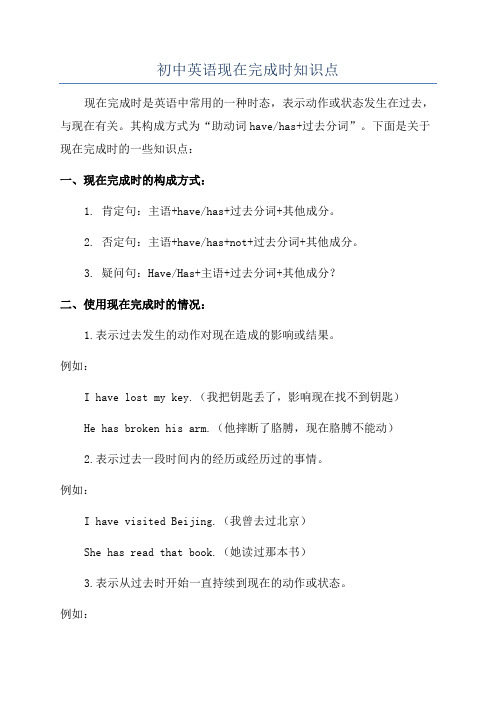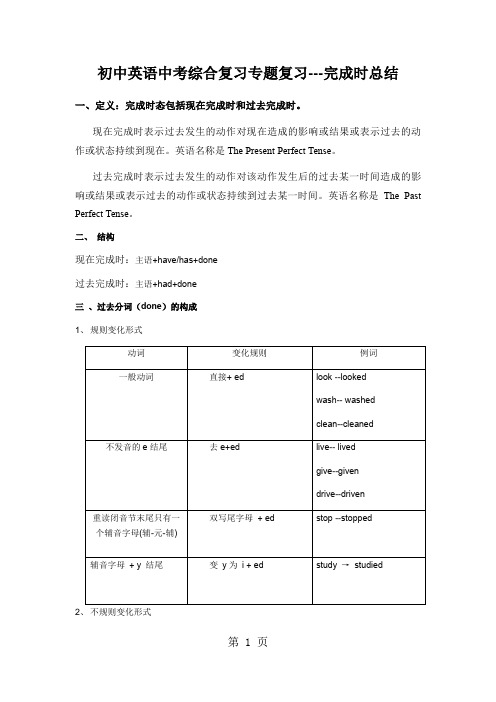初中英语语法——现在完成时知识点总结归纳
(完整word版)初中英语知识点总结:现在完成时,推荐文档

初中英语知识点总结:现在完成时(1)现在完成时表示某个动作发生在过去,但对现在有影响(或结果),这个动作或状态可能已经结束,也可能还要持续下去。
其构成形式是:have/ has + 动词过去分词否定句在have/ has 后加not→haven’t/ hasn’t疑问句要将have/ has放到主语之前。
(2)现在完成时的用法。
①表示过去发生的动作对现在造成的影响和结果。
常用的时间状语有:already, yet, ever, never, just等。
如:I have already finished the work.Have you ever been to Beijing?He has never seen such a nice car.②表示过去已经开始,持续到现在的动作或状态。
往往和表示一段时间的状语连用。
如:for + 时间段;since + 时间点(表时间段);时间段+ago;一般过去时态。
如:I have taught in this school for ten years.I have taught in this school since ten years ago.③for和since引导的短语都表示“一段时间”,所以谓语动词应该用延续性动词,不能用非延续性动词。
延续性动词表示该动词可以延续一段时间,如:live, work, study, teach, stay等,非延续性动词是指该动词所表示的动作不能持续,是短暂的、瞬间完成的,如:borrow, come,arrive, get, leave, die等。
许多非延续性动词可以用意思相同或相近的延续性动词来表示:leave ---- be away from arrive ---- be ingo ---- be away come ---- be in / at finish ---- be over buy ---- have borrow ---- keep die ---- be deadjoin ---- be in/be a member of begin ---- be on如:He has gone He has been away for an hourI have bought a watch I have had the watch for several days④have/ has been to 和have/ has gone tohave/ has been to :曾去过have/ has gone to :已去,去了(不在说话现场,在途中或已经到达)My mother has been to America. 我妈妈曾经去过美国My mother has gone to America. 我妈妈已经去了美国(3)现在完成时与一般过去时的用法比较①一般过去时只单纯表示过去,和现在不发生联系,它可以和确定的表示过去的时间状语连用。
初中英语现在完成时知识点

初中英语现在完成时知识点现在完成时是英语中常用的一种时态,表示动作或状态发生在过去,与现在有关。
其构成方式为“助动词have/has+过去分词”。
下面是关于现在完成时的一些知识点:一、现在完成时的构成方式:1. 肯定句:主语+have/has+过去分词+其他成分。
2. 否定句:主语+have/has+not+过去分词+其他成分。
3. 疑问句:Have/Has+主语+过去分词+其他成分?二、使用现在完成时的情况:1.表示过去发生的动作对现在造成的影响或结果。
例如:I have lost my key.(我把钥匙丢了,影响现在找不到钥匙)He has broken his arm.(他摔断了胳膊,现在胳膊不能动)2.表示过去一段时间内的经历或经历过的事情。
例如:I have visited Beijing.(我曾去过北京)She has read that book.(她读过那本书)3.表示从过去时开始一直持续到现在的动作或状态。
例如:I have lived in this city for ten years.(我在这个城市住了十年了)He has worked here since 2024.(他从2024年开始在这里工作)三、现在完成时和过去时的区别:1.现在完成时强调的是过去发生的动作对现在造成的影响或结果,而过去时则强调过去发生的动作并没有与现在产生任何关系。
例如:I have finished my homework.(我已经完成了作业,现在可以放松了)I finished my homework.(我完成了作业,但现在可能还有别的事情要做)2. 现在完成时通常与表示时间段的副词连用,如already(已经)、yet(还)、never(从未)、ever(曾经)、just(刚刚)等,而过去时则没有这种固定搭配。
例如:I have already eaten lunch.(我已经吃过午饭了)I ate lunch.(我吃了午饭)四、现在完成时常见的时间状语:1. 现在完成时常与一段时间的延续连用,如for(表示一段时间)、since(表示自从一些时间点以来)等。
现在完成时(unit8--unit10知识点总结)人教版英语八年级下册

现在完成时一.定义三要素与构成〔has/have done〕1.表示到现在为止已经完成或刚刚完成的动作。
By now, I have remembered 1000 English words.2.一件发生在过去的事情对现在产生影响。
常见时间状语:常和already〔已经〕,yet〔已经〕,just〔刚刚〕,still〔仍旧〕,so far〔到目前为止〕,till now,(直到现在),before〔以前〕,ever〔曾经〕,3 times(三次),in the past/last..years(在过去几年)I have spent all of my money so far.(1)already:〔已经〕用于确定句位置:放于助动词与done 之间或者放在句末(2)yet:疑问句〔已经〕否认句〔还〕位置:常放句尾(3)ever(曾经):疑问/确定位置:助动词与done之间(4)never〔从不〕位置:助动词与done之间【练习】〔1〕——你吃过早餐了吗?—Have you had breakfast ____?——是的,我已经吃过了。
/不,我还没吃。
—Yes,I have ________ had it./No,I haven’t had it ____.〔2〕I have ______ read this book,so I don’t know what it is about.〔3〕—Have you _____ been to the Great Wall? It’s so wonderful and great.—No,I have ______ been there.3.一个动作开头于过去,并持续到现在〔或许还将持续下去〕。
常见时间状语:①for+一段时间“长达/持续了……②since+过去一个时间点,表示“自从……以来〞时间段+ago,表示“从……以前〞+for+时间段从句〔一般过去时〕eg:Mary has been ill for three days.We have been classmates since 2 years ago.【练习】〔1〕我已经住在这里十年了。
现在完成时专题讲解

现在完成时专题讲解现在完成时态专题讲解一、注意理解时态的两层意义及不同意义对应的标志词观察一:请仔细观察下列句子。
1.I have already finished reading the book.(现在我了解了书的内容).2.Have you had lunch yet? Yes, I have.(我现在不饿了).3.He has never seen the film before. (现在他不了解电影的内容)4.I have just washed my car.(现在车很干净了)5.I have seen the film three times. (我现在了解电影的内容)思考一:现在完成时表达的含义:1)表示在发生或已经结束的动作对造成的影响或结果标志词:常与already(已经),yet(已经),just(刚刚),before,ever(曾经),never,three times等词连用。
常用于肯定句中, 常用于否定句,疑问句句尾。
练习、翻译以下句子1、你已经找到你的书了吗? (find-found your book)2、他们已经在这个城市建了许多房子. (build-built many buildings)3、Judy还刚到达. (arrive-arrived)观察二:请仔细观察以下句子1.We have been in Qi Bin Middle School since 2013.(我们还在淇滨中学)2.He has learned English for 5 years/since 5 years ago/sinceI was in primary school.(他还在继续学习英语)3.China has made great changes these years/up to now/so far.(现在还在发生变化)思考二:现在完成时表达的含义:2)表示在过去已经开始并到现在。
初中英语中考综合复习专题复习---完成时(现在完成时 过去完成时)总结-文档资料

初中英语中考综合复习专题复习---完成时总结一、定义:完成时态包括现在完成时和过去完成时。
现在完成时表示过去发生的动作对现在造成的影响或结果或表示过去的动作或状态持续到现在。
英语名称是The Present Perfect Tense。
过去完成时表示过去发生的动作对该动作发生后的过去某一时间造成的影响或结果或表示过去的动作或状态持续到过去某一时间。
英语名称是The Past Perfect Tense。
二、结构现在完成时:主语+have/has+done过去完成时:主语+had+done三、过去分词(done)的构成1、规则变化形式2、不规则变化形式四、时间标志词1. 现在完成时的时间标志词【例句演练】1)All of their students have made rapid progress in the past few years. 2)I have lived here since twenty years ago.3)This is the most interesting news I have ever told.4)I haven't heard from my uncle for years.5)I have already written 10 books.6)We'll start at once if the rain has stopped.7)I have seen the movie twice.8)He has been to Beijing many times up to now.2. 过去完成时的时间标志词1) It was the third time that he had made the same mistake.2)He had taken the exam.3)I had been to America.4)They had visited a doctor.5)A thief had stolen my watch before I got home.6)It had rained heavily by last month.7)The students had gone before the teacher came.五、易错点当出现since+过去时间点/ for +时间段/ How long提问等3种情况时,主句中的谓语必须要是可持续动词的完成时。
现在完成时知识点详解(初中英语专项复习) (6)

现在完成时知识点详解(初中英语专项复习)知识点01现在完成时基本结构【语法详解】主语+have/has+动词的过去分词①肯定句:主语+have/has+动词的过去分词+宾语.①否定句:主语+have/has+not+动词的过去分词)+宾语.①一般疑问句:Have/Has+主语+动词的过去分词+宾语.①特殊疑问句:特殊疑问词或词组+一般疑问句(have/has+主语+过去分词(V-ed)+其他)【即学即练】—In the past few years,China’s space program__________a lot.—That’s true.It successfully sent twelve more astronauts to the space station.A.achieves B.achieved C.has achieved D.is achieving【答案】C【详解】句意:——在过去几年,中国的航天已经取得了很大的成就。
——对的,它成功地将12名宇航员送入了太空站。
考查时态。
achieves一般现在时;achieved一般过去时;has achieved现在完成时;is achieving 现在进行时。
根据“In the past few years”可知,用现在完成时,故选C。
知识点02过去分词变化规则【语法详解】1.规则动词:规则动词的过去分词的构成规则与规则动词的过去式的构成规则相同。
变化规则有四点:(1)一般动词,在词尾直接加"-ed"。
work→worked→worked visit→visited→visited(2)以"e"结尾的动词,只在词尾加"-d"。
live→lived→lived(3)以"辅音字母+y"结尾的动词,将"y"变为"i",再加"-ed"。
study→studied→studied cry→cried→cried(4)重读闭音节结尾,末尾只有一个辅音字母,先双写该辅音字母,再加"-ed"。
初中英语现在完成时语法归纳
初中英语现在完成时语法归纳初中英语现在完成时语法归纳现在完成时用来表示之前已发生或完成的动作或状态,其结果现在还存在;也可表示持续到现在的动作或状态。
其构成:have (has) +过去分词。
1)一般过去时表示过去某时发生的动作或单纯表达过去的事情,强调动作;现在完成时为过去发生的,强调过去的事情对现在,强调的是影响。
2)一般过去时常与具体的时间状语连用,而现在完成时通常与模糊的时间状语连用,或无时间状语。
一般过去时的时间状语:yesterday, last week,…ago,in1980, in October, just now等,皆为具体的时间状语。
现在完成时的时间状语:for, since, so far, ever, never, just, yet, till/until, up to now, in past years, always等,皆不确定的时间状语。
共同的.时间状语:this morning, tonight, this April, now, already, recently, lately 等。
3)现在完成时可表示持续到现在的动作或状态,动词一般是延续性的,如live, teach, learn, work, study, know.。
4)一般过去时常用的非持续性动词有e, go, leave, start, die, finish, bee, get married等例如:I saw this film yesterday. (强调看的动作发生过了)I have seen this film. (强调对现在,电影的内容已经知道了)Why did you get up so early?(强调起床的动作已发生过了)Who hasn't handed in his paper?(强调有卷子未交,疑为不公平竞争)He has been in the League for three years. (在团内的状态可延续)He has been a League member for three years. (是团员的状态可持续)5)句子中如有过去时的时间副词(如yesterday, last, week, in 1960)时,不能使用现在完成时,要用过去时。
初中英语语法——现在完成时与过去完成时
现在完成时与过去完成时一、现在完成时过去发生并且已经完成的动作对现在造成影响或后果,过去某一时间开始并一直持续到现在的动作或状态。
1.构成现在完成时是由助动词have(has)+动词的过去分词构成。
助动词说明该谓语是属于现在时范围。
它和主语的人称、数要保持一致。
过去分词是主要的谓语动词,说明句子的意义。
2.用法(1)表示动作发生在过去某个不确定的时间,但对现在留下了某种影响和结果。
常被just、already、yet 等副词修饰。
如:-Have you had lunch yet? -Yes,I have. I've just had it. 你(已经)吃午饭了吗?我刚刚吃过。
(现在我不饿了)(2)表示从过去某一时刻开始一直持续到现在的动作或状态。
这个动作可能刚停止,可能仍然在进行。
常带有for和since等表示一段时间的状语。
如:He has taught here since 1981. 他自1981年就在这儿教书。
(可能还要继续教)I have't seen her for four years. 我有四年没见到她了。
(3)表示说话前发生过一次或多次的动作,现在成为一种经验,一般译为汉语“过”,常带有twice, ever, never, three times等时间状语。
如:I have been to Beijing twice.我去过北京二次。
3.结构1).陈述句结构:主语+have( has)(not)+过去分词+其它。
have not=haven’t has not=hasn’t.2).一般疑问句结构:Have( Has )+主语+过去分词+其它?3).特殊疑问句:特殊疑问词+have(has) +主语+ 过去分词+其它?eg. He has already finished his homework.He hasn’t finished his homework yet.Has he finished his homework yet?--Yes, he has./ No, he hasn’t./ No, not yet.4.现在完成时的时间状语(1)现在完成时属于现在时范围,故不能和过去的时间状语连用。
初中英语现在完成时知识点整理
初中英语现在完成时知识点整理
初中英语现在完成时知识点整理
1)表示过去发生的动作对现在造成的影响或结果.常与already, just, ever, never, before等词连用. 如:
She has never read this novel.
2)表示"过去的动作"一直延续到现在并有可能继续延续下去. 常与for (后跟段时间)或since (后跟点时间)等连用.如:
I have been a member of the Party for 10 years.
I have been a member of the Party since 10 years ago.
注:在有for 和since 引导时间状语的'句子中不能用短暂性动词,应用与之相应的表示状态的词。
如:
He has died for 3 years.(F)
He has been dead for 3 years.(T)
注:①现在完成时不能和表示明确的过去时间连用。
如:in 1998, last morning等
②have/has been to 表示"去过"(去了又回来了)
have/has gone to 表示"去过"(去了没回来了)
如:Where has she gone?(句中所指的人不在)
Where has she been?(句中作指的人在)。
初中英语语法 现在完成时
初中英语语法现在完成时初中英语语法现在完成时1、现在完成时的构成:现在完成时是由“助动词have/has+动词过去分词”构成的。
①助动词have/has可以与主语缩写为’ve/’s。
e.g. I have → I’ve We have → We’ve He has → He’s It has →It’s②规则变化的过去分词与动词过去式一样。
③不规则变化的动词过去分词见表。
2、现在完成时的基本句型。
①陈述句肯定形式。
e.g. I have had lunch. 我已经吃过午饭了。
He has gone to Beijing. 他去北京了。
②陈述句否定形式。
(在助动词have/has后+not,可缩写为haven’t/hasn’t)e.g. I haven’t had lunch. 我还未吃午饭。
He hasn’t gone to Beijing. 他还没有去北京。
③一般疑问句形式及其答语。
(将助动词have/has提前,答语一般用have, has回答)e.g. Have you had lunch? 你吃过午饭了没? Yes, I have. No, I haven’t.Has he gone to Beijing? 他去过北京了没有? Yes, he has. No, he hasn’t.否定回答还可以用:No, not yet. / No, never. / No, not even once等。
④特殊疑问句形式。
(疑问词+一般疑问句)e.g. Where has he gone? 他去了哪里?3、现在完成时的三个基本用法。
(1) 现在完成时的第一个基本用法表示过去发生或已完成的某一个动作对现在造成的影响或结果。
e.g. Have you had lunch? Yes, I have. I’ve just had it. 你吃过午饭没?有,吃过了,我刚刚吃的。
(影响及结果:我现在饱了,不需要了)He has gone to Beijing. 他已经去北京了。
- 1、下载文档前请自行甄别文档内容的完整性,平台不提供额外的编辑、内容补充、找答案等附加服务。
- 2、"仅部分预览"的文档,不可在线预览部分如存在完整性等问题,可反馈申请退款(可完整预览的文档不适用该条件!)。
- 3、如文档侵犯您的权益,请联系客服反馈,我们会尽快为您处理(人工客服工作时间:9:00-18:30)。
初中英语语法——现在完成时知识点总结归纳
现在完成时
构成:主语+助动词have, has+过去分词
用法:
1) 表示过去发生的和现在有某种联系的动作,常和just, usually, already, since等时间副词连用。
I have just had lunch. (饱了,不用再吃了。
)
He has had a cup of tea.(不渴了,不用再喝。
)
They have already had their holiday. (不能再度假了。
)
The boy has already read the book. (已经知道书的内容了,不用再看了。
)
2) 询问别人是否做过某事一般用现在完成时:
Have you finished your homework?
Have you been to Beijing?
Have he seen the film?
3) 表示开始于过去并持续到现在的动作
I have lived in Beijing for twenty years.
I have worked for this school for 1 year.
4) 表示一种经历,经验:去过…地方,做过…事情,经历过…事情
I have never had a bath.
I have never seen a film.
I have never been to cinema.
I have ever been to Paris.
Have been to表示去过,have gone to 表示去了
I have been to London.(人已经回来)
He has gone to London.(人还在那里)
5) 表示一种结果,一般不和时间副词联用
I have lost my pen.
I have hurt myself.
He has become a teacher.
She has broken my heart.
句型变化:
★变疑问句将助动词移到句首,变否定句在助动词后面加not.
Have you lost your pen? I have not lost my pen.
★肯定回答及否定回答
Yes, I have. / No, I have not.
★特殊疑问句
What have you done?
What has he done?
一般过去时与现在完成时的区别:
凡是有明确的表示过去的时间状语的句子为过去时。
注意:有些动词表示的动作有一个终点,不能再延续,因此不能和表示一段时间状语连用。
错:I’ve left Beijing for 3 days.
对:I left Beijing 3 days ago.
I have been away from Beijing for 3 days.
知识提升:
现在完成时:
1.构成:have / has + 过去分词
2.功能:
(1)表示过去所发生的动作对现在的影响或产生的结果。
常与yet, just, before, recently, lately(最近), ever, never等表时间的副词搭配使用。
►. He hasn't seen her lately. ►. I haven't finished the book yet.
(2) 表示一个从过去某个时间开始,延续到现在并可能持续下去的动作,常与表示一段时间的时间状语连用。
如:so far(迄今为止), up till now(直到现在), since, for a long time(很长时间), up to present(直到现在), in the past / in the last few years(在过去的几年里), these days(目前)……
►. He has worked here for 15 years. ►. I have studied English since I came here.
►. The foreigner has been away from China for a long time.
►. So far, I haven't received a single letter from my brother.
(3)某些非延续性动词(即:动作开始便终止的动词),在现在完成时中不能与表示一段时间状语搭配。
黄金要点:
I. 常见的非延续动词:die, arrive(到达), join(加入), leave(离开), go, refuse(拒绝), fail(失败), finish, buy, marry, divorce(离婚), awake(醒), buy, borrow, lend ... (背三遍!)
II.这类动词并非不能用现在完成时,而是不能接常由for引导的时间状语。
III.但若是用在否定句中,非延续动词的现在完成时可以与表示一段时间的状语连用。
►. She has gone away for a month.(误)
►. She has been away for a month (正)
►. The man has died for two years.(误)
►. The man has been dead for two years.(正)
►. How long have youbought the book?(误)
►. How long have you got the book.(正)
(4)注意since的用法:
►. They haven't had any trouble since they came here.
►. It has been ten years since we met last time.
►. He has been here since 1980.
►. He has been here since ten years ago.
几组对比:
►. He has gone to Shanghai. 他到上海去了。
►. He has been to Shanghai. 他去过上海。
►. She has gone. 她已走了。
►. She is gone. 她缺席了。
(或者她死了。
) ►. The door has been closed. 门关上了。
(动作)►. The door is closed. 门是关着的。
(状态)
测试精编
1. The prices ________ going up all the time in the past few years.
A. keep
B. kept
C. have kept
D. are keeping
2. For the whole period of two months, there ________ no rain in this area.
A. is
B. will be
C. has been
D. have been
3. Today is Jane's wedding day. She ________ John.
A. have just married with
B. was just married to
C. has just been married to
D. just has been married to
4. No wonder the flower have withered, they ________ any water for ages.
A. hadn't
B. haven't
C. haven't had
D. hadn't had
5. Nowadays computer ________ a wide application with the development of production and science.
A. found
B. has found
C. finds
D. had found
KEYS 1. C 2. C 3. C 4. C 5. B。
